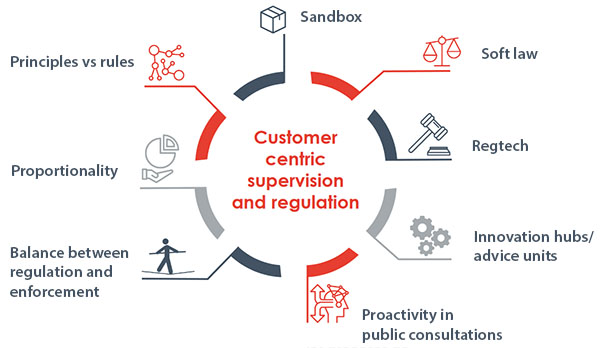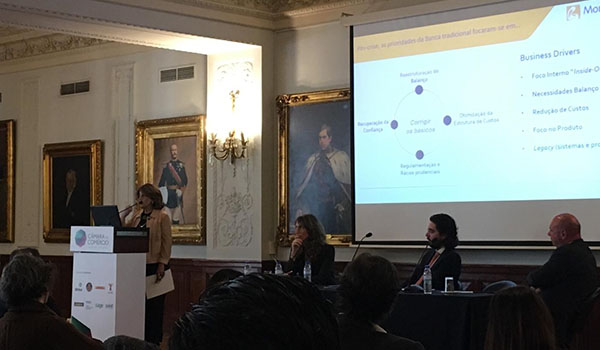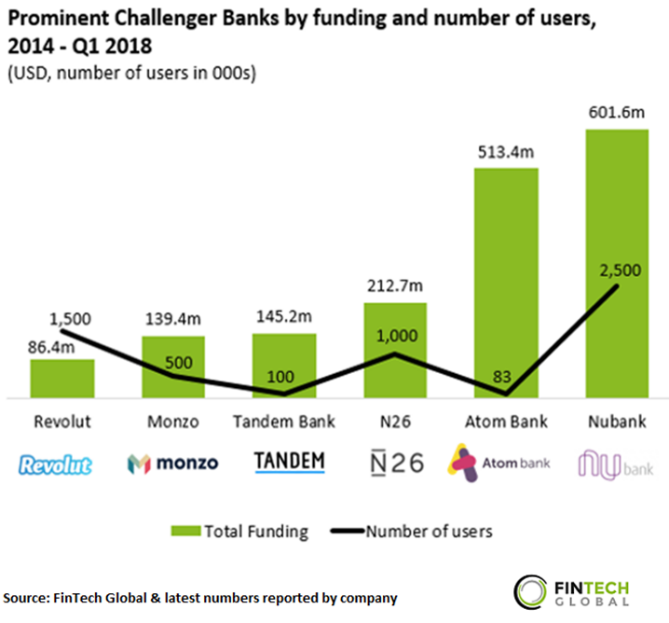María Ruiz de Velasco, Chartered FCSI, solicitor and head of fintech and financial regulation at ECIJA Law & Technology, organised the inaugural event to enable the main players of the Iberian fintech space to meet, share experiences and discuss the key topics that concern both financial institutions and regulators
Maria Ruiz de Velasco, Chartered FCSI, addressing delegates at the conference
The event, titled ‘Fintech: new business models and legal challenges in the current regulatory framework’ took place on 13 February 2019 in the main hall of the Portuguese Chamber of Commerce. Over 150 delegates attended, to hear and participate in discussions of how new technologies are impacting and creating new business models in the financial sector, and analyses of the main legal challenges in the current regulatory framework.
The speakers were distinguished players in the Portuguese and Spanish financial services sectors, as well as supervisory authorities such as the European Commission, CNMV, CMVM and Banco de Portugal.
Here, some of the speakers share some of the key topics that were discussed at the conference.
Maria Ruiz de Velasco, Chartered FCSI
Some of the main problems and handicaps that financial institutions and regulators face at the time of the Fourth Industrial Revolution are the length, complexity and bureaucracy that surrounds the legislative and the supervisory process.
From a regulatory perspective, challenges include:
- Regulatory arbitrage – perhaps the biggest risk, and it is often the result of a mixture of sector pressures and a lack of capacity for a timely and coordinated response at international level.
- Slowness of the legislative processes – which directly collide with the rapid pace at which fintech is developing. Cases like the Packaged Retail and Insurance-based Investment Products (PRIIPs) Regulation that took over ten years to see the light (and is still under discussion) will not be feasible in this new technological landscape.
- The capacity of regulators to monitor the regulatory perimeter on a real-time basis and determine without delay whether new services and products are within its scope.
- Ensuring a level playing field and the principle of technological neutrality.
From a supervisory perspective, challenges include:
- Ensuring supervisory convergence at international level, thus ensuring a level playing field.
- Impeding a race to the bottom among supervisory authorities – authorities should not lower entry requirements to attract fintech firms.
- Guaranteeing high levels of consumer protection.
- Providing authorities with the right tools to facilitate cyber security.
- Better enforcement – there is a clear need for a more coordinated enforcement action between supervisors.
In an increasingly globalised and technological world, an open dialogue and close collaboration between all stakeholders in the fintech space becomes a priority. Authorities such as the European Banking Authority (EBA) encourage this form of collaboration through the recently created
FinTech Knowledge Hub in which stakeholders can participate, with the aim of improving the monitoring of financial innovation and facilitating the exchange of knowledge and information on fintech issues.
In addition, the UK financial regulator, the FCA, has recently announced that 29 supervisory authorities form part of the
Global Financial Innovation Network, which is a network of regulators intended to provide an innovative service in how entities communicate with regulators and facilitate a new practical method of regulatory collaboration on innovation, as well as creating an environment for cross-border testing.
These alliances also exist among Latin-American markets, as demonstrated by the signing of a
Memorandum of Understanding on fintech by several countries that are members of the Ibero-American Institute of Securities Markets, to provide a space for collaboration and mutual consultation for the supervisory authorities in connection with fintech projects.
The challenges that fintech has brought to regulators are vast, especially due to the speed of change, so, depending on the legal system of each country and the mandate of the regulator, some customer centric supervision and regulation tools have already been tested and are proving satisfactory to embrace this new reality.

Source: ECIJA
As we all know, there are no perfect or absolute regulatory or supervisory models, since they are rarely possible in a world of dynamic, sophisticated and constantly changing markets.
Nonetheless, regulatory policies and supervisory models that reflect and adapt to this dynamism through the application of agile approaches and customer centric tools are more likely to thrive in guaranteeing market integrity, investor protection and the formation of capital.
Dulce Mota, CEO, Banco Montepio

Dulce Mota speaking, and João Pedro Deconinck Pimenta seated on the right
Over the past decade, while traditional banks have focused on internal measures to overcome the financial crisis, such as balance sheet restructuring or cost structure reductions, major changes have occurred in parallel and intensified in the market, impacting the status quo of the financial services sector.
Consumer habits have changed radically in the past decade and have made us increasingly dependent on digital. The experience that the consumer has in their digital journey is today more valued than the product or service itself.
In this context, new digital players appear at an exponential speed, filling the gaps between the offer and the experiences they have always had; and those that perfectly match the new expectations of the market. These new players, lighter and more agile, bring consumers new value propositions and disruptive digital experiences.
Meanwhile, traditional banks are faced with heavy structures segregated into silos, dependent on legacy systems and with cultures sometimes at odds with change. For most incumbents, the process of change is slow and painful, making evident the need to transform the entire organisation structurally and culturally.
It is in this context that the great movements of digital transformation are born. These programs essentially aim to ‘digitalise’ the operating models, enabling them to be agile and efficient, and transferring the internal focus to a focus on the customer, redesigning the customer journey to provide an excellent digital and omnichannel experience.
They are not, therefore, the movements of simple digitisation of existing offline processes, but rather broad movements based on a different and simplified approach, with digital considered at the outset.
In the context of digital transformation processes, banks are facing a new Payment Services Directive (PSD2), which opens the door to new players in the market, which can be seen as a threat to incumbents. However, PSD2 also provides opportunities for banks to rethink their business model and create new business models in the context of Open Banking.
Faced with the threat of being disintermediated by new players, traditional banks started looking at fintech as potential partners in the rapid acquisition and internalisation of innovation. In this sense, they are increasingly promoting, with fintech firms, models of open and collaborative innovation, or other models that include the acquisition or participation in the capital of these fintech firms.
Banking is in an accelerated process of disruption, with negative impacts for established players who lack vision, courage and adaptability to this new paradigm. The biggest threat to traditional banking is therefore not the appearance of fintech, but its inability to innovate; and the risk of becoming irrelevant to its customers. On the other hand, their greatest competitive advantage is the trust, loyalty and closeness that come from their years of operation and the physical footprint they have built with their networks, true centres of personal relationships, which have not yet found parallel in the digital world.

João Pedro Deconinck Pimenta, country head, ABANCA Portugal
The financial sector is experiencing a radical global transformation as a consequence of the eruption of powerful forces that have changed the customer-bank relationship. The three aspects that define this new competitive environment are: digitalisation of society; entry of new competitors from other sectors; and increasing regulatory pressure.
As a result of the combination of these factors, a new paradigm arises where the customers’ power grows. They benefit from this new relationship based on transparency and mobility with their financial entities.
To meet these challenges, we are carrying out a comprehensive strategy of digital transformation based on four priorities: IT architecture; processes; corporate culture; and customer experience.
In recent years, we have been focused on placing customers in the centre of business by implementing best practices and creating specialised units that provide quality customer service and solutions. In addition, we have boosted digital transformation by means of technological investments and the incorporation of innovation at all levels of the corporation. This effort will continue in a second stage, which is addressed to a new open banking platform.
We are facing this new transformation scenario while developing a growth plan in new markets. This expansion plan, in which Portugal is a key market, is built on ABANCA’s sound positioning among Spanish banks with the best financial profile, with profitability and solvency levels that allow it to be an active player in the transformation of the financial sector.
Views expressed in this article are those of the authors alone and do not necessarily represent the views of the CISI.